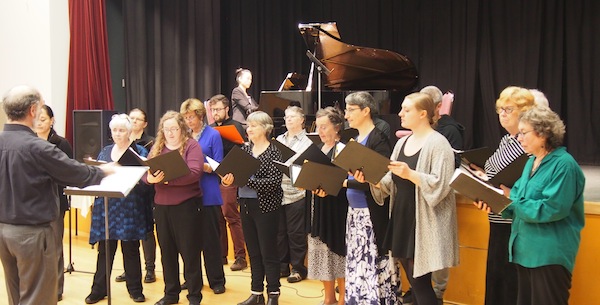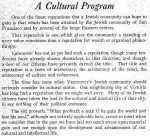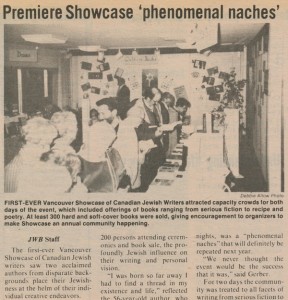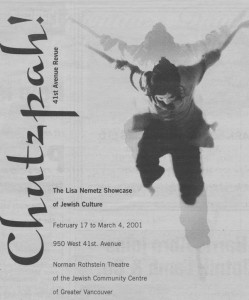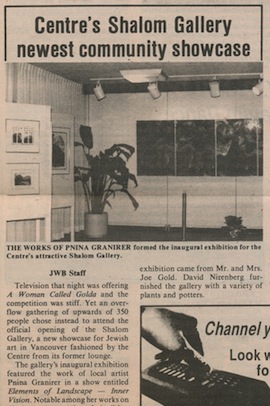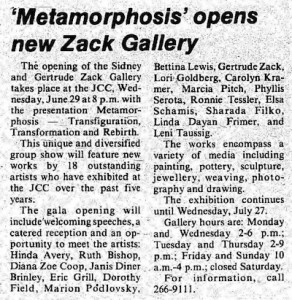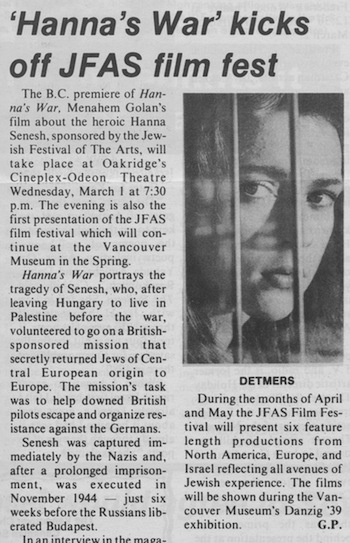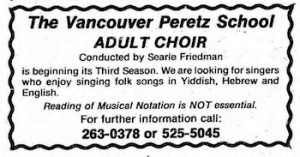The Vancouver Jewish Folk Choir in a performance last fall at the Peretz Centre, led by conductor David Millard, with pianist Danielle Lee. (photo from VJFC)
As they say, nothing comes from nothing and so it is with the Vancouver Jewish Folk Choir of the Peretz Centre for Secular Jewish Culture. Officially, our birth date was 1979 – and that’s what we’re celebrating in the June 9 spring concert unironically called Freylekhe Lider: Yiddish Party Songs – but, when you come right down to it, we were in labour for around 25 years before finally coming into the world.
An early predecessor to the Vancouver Jewish Folk Choir was a group called the UJPO’s Vancouver Jewish Folk Singers. UJPO was the United Jewish People’s Order and it was a decidedly political organization that positioned itself somewhere left of Lenin. Its eight-member choir, though keen on socially progressive issues as well, was somewhat less political and more focused on bringing Yiddish and international music to the Vancouver community. Yiddish singer Claire Osipov, the choir’s founder and director, formed the group in 1956 and kept it going for six years. In that time, the choir performed at Peretz Centre events, as well as reaching out to the community beyond. On two occasions, the choir performed at the CBC studio and was broadcast over CBC Radio.
Everyone familiar with Claire knows she seems to have boundless energy when it comes to her love of music and so, to no one’s surprise, she took on additional musical duties and began a children’s choir at Peretz in 1959. The Peretz Centre had an active children’s education program under principal Leibl Basman and Claire’s choir drew on this group, bringing in children who ranged in age from 7 to 11. Noteworthy in this choir was part-time piano accompanist Gyda Chud, current president of the Peretz Centre.
Time and circumstance brought both those choirs to an end some time in the 1960s and, for a time, the halls of the Peretz Centre were chorally silent.
Then, a Peretz choir formed under the direction of Morrie Backun, an employee of Ward’s music. Little is remembered about this choir because Morrie discontinued the group after just one year. Tammy Jackson sang in this choir and one of her main recollections is not so much the repertoire and performances as the brilliant discount they got on sheet music.
* * *
Searle Friedman arrived on the Vancouver scene 1978. He had been out of the country for a number of years studying music in East Germany. After his studies, he and his family – wife Sylvia and sons Michael, Robert and David – settled in Toronto, where Searle became conductor of the Toronto Jewish Folk Choir.
After a time, the family decided to move to Vancouver and Searle came here on his own initially to pave the way. At first, he taught at an alternative education program (called Relevant High School) that was based at what was then called the Vancouver Peretz Institute but, after a year, he parted company with that organization. Since his Ontario teaching credentials were not immediately transferable to British Columbia, Searle spent much of his time at Peretz and it was there that he had a conversation with Tammy, who suggested that he form a choir to occupy his time.
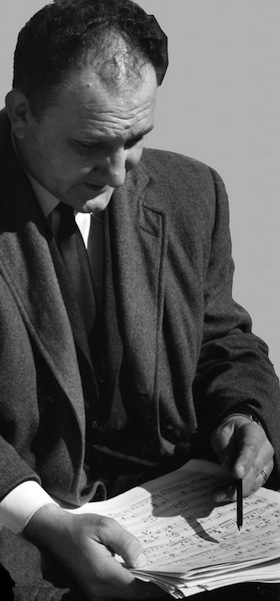
The beginnings of the Vancouver Jewish Folk Choir were rather humble, comprising just a few members and a Russian pianist named Wolfgang. The roster at that time is only vaguely remembered but it certainly included Tammy (Searle’s niece) and Sylvia (his wife). It likely also included David Friedman (Searle’s son), Goldie Shore, Betty Ewing, Davie Cramer, Carl Lehan and Margie Goldhar. When there were no-shows at rehearsals, the standing joke was that the choir could at least consider the possibility of becoming a barbershop quartet.
In those early years, the choir performed informally at various Peretz Centre festival occasions and cultural gatherings. The repertoire was a potpourri of traditional Jewish folk songs sung in Yiddish, as well as some non-Jewish selections that piqued Searle’s interest – “Roosters Crowing on Sourwood Mountain” and “Martian Love Song,” to name two. Incidentally, Searle could never figure out why the “Roosters” song never sounded quite right, until one day he discovered somebody in the bass section was singing “roosters growing on the side of the mountain.”
But the choir grew rapidly. Searle was not just a brilliant conductor and arranger. He was very much a people person and had a charisma and affability that drew others to him. He had a knack for making his singers believe in themselves. Maurie Jackson, an early recruit, recalls Searle often saying to struggling singers: “If you can talk, you can sing!” In a short time, the choir grew to around 30 members, including me.
I had seen Searle’s choir perform and I thought about joining but my interest was kind of a passing thing. I was determined to do something Jew-ish but my real hope was to join a folk dancing class at the Jewish Community Centre. My job kept me glued to a desk most days. I figured folk dancing would be a good way to get some exercise, lose some weight and meet new people. As fate would have it, the folk dancing class was canceled, so I had to begrudgingly fall back on my second choice – the choir. It was a choice that I stuck with for almost 36 years and a choice that introduced me to Tammy – the remarkable lady I’ve been married to for 31 years and counting.
Tammy’s uncle, Searle, was inordinately pleased to know he had played matchmaker to two of his choir members. As often as Searle gave me pointers on singing, he also asked for updates on the state of my relationship with his niece: “Are you seeing each other after choir?” “Are you engaged yet?” “Do you have a wedding date?”
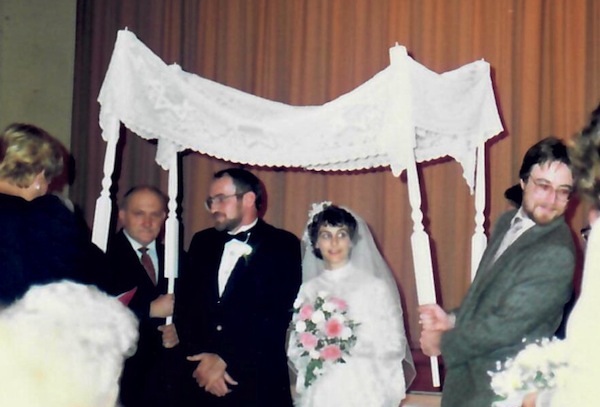
Rehearsals were a lot of fun. Searle liked to laugh and humour was always a part of our repertoire. I recall one day when Searle was working hard at getting us to blend our voices more closely. He wanted to hear the choir singing as one voice. After puzzling over how to make us understand this, he said, “I want all of you to try really hard to feel each other’s parts!” That did us in for most of the rest of that rehearsal, and even Searle had to take time to get back his concentration.
Searle’s one nemesis in rehearsals was his wife, Sylvia. While the rest of us were in awe of his talents and put Searle on a pedestal, Sylvia felt no such compunction. She freely advised Searle of proper pronunciations of Yiddish words and even was vocal about the pace of various songs when she thought Searle had got it wrong. The expression we often heard from Sylvia was, “In my village….” The expression we often heard from Searle was “Sylvia, who’s running this choir?” For fear of hurting his feelings, no one ever answered that question. Many a rehearsal degenerated into heated debates regarding Yiddish linguistics and the proper treatment of traditional songs.
As well as increasing the size of the choir, Searle wanted to increase our presence in the community and give us a focal point for our efforts. With that in mind, we performed our first annual spring concert in the spring of 1984. Our guest artists were the Shalom Dancers. In addition to the choir fans who attended, the Shalom Dancers brought to the performance their own appreciative followers. The result was a very large and lively audience. The pervasive feeling in the choir was, “We’ve got to do this again!” And so, we have, every spring.
* * *
Searle’s energy and love of music had always made him seem like an unstoppable force of nature. We thought and hoped he would last forever. We were wrong. Due to a childhood bout of rheumatic fever, his robust exterior masked the effects of a damaged heart. When he was still a young man, his doctors basically told him not to take on any long-term magazine subscriptions. They said that, with the damage to his heart valves, he would not survive past the age of 40. Searle’s response was to get married, raise three sons, travel to East Germany to study music, get his Canadian teaching certificate and start a choir. When it came to living his life, Searle was not about to call it a day.
In September 1974, Searle had a heart valve replacement and got on with his life. After he founded the Vancouver Jewish Folk Choir in 1979, he was spending repeated stints in the hospital. Nevertheless, he pushed through his medical setbacks and always came back to us ready to lead the choir without a backward glance.
I had a conversation with Searle that pretty much says it all. I was visiting him in the hospital.
Me: How are you doing, Searle?
Searle: Fantastic! I’ve gotten some very good news from my cardiologist.
Me: (greatly relieved) Wonderful! What did he tell you?
Searle: Well, it turns out he sings in a choir and he’s not happy with it. He’s thinking of joining ours! And he’s a tenor!
Searle returned to us from that hospital stay and all of that seemed behind him. But tragedy struck on Dec. 31, 1990. Searle’s heart just stopped. He was only 64.
Just over a week later, we had our first choir rehearsal without Searle. We stood in a large circle and began our warm-up exercises, led by our accompanist, Susan James. No one’s mind was on what we were doing. After a few minutes, I suggested we stop so I could say a few things about Searle. I can’t remember exactly what I said but I spoke about Searle and how much the choir meant to him, and about keeping it going as a tribute to his memory. The floodgates opened. Every choir member spoke of how much Searle had meant to them personally. When it ended, we got down to the business of carrying on what he had begun. If we doubted ourselves, we only had to look at one of the choir members who stood in that same circle to warm up and sing with the rest of us – Searle’s wife, Sylvia.
* * *
After Searle’s passing, Susan stepped up and became our conductor. She was a more reserved individual than Searle but a skilled conductor and her attention to detail was legendary. Nothing got by her and every note sung that was not to her satisfaction was drilled again and again until we got it right. And, sometimes, when the notes were right, we were still stopped dead in our tracks because the page turns were too loud. We worked harder during rehearsals, and we were better singers for it.
Susan’s tenure was five years. She was a devout Christian and the choir was composed mostly of a bunch of godless secularists. In her farewell letter to the choir, she expressed her sadness at not being able to share her beliefs with the rest of us. She left in 1995, after our annual June concert and our season had ended.
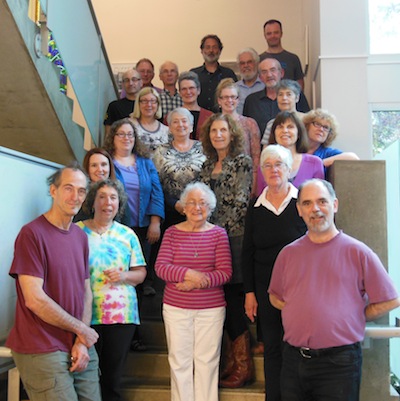
Again, a member from our ranks stepped up and helped us carry on. In fall 1996, David Millard – who for a few years had been a paid professional singer in our tenor section – became our conductor and, much to our good fortune, is still at it today.
Over the years, David has conducted, served as our resident Yiddishist, sung as a soloist, filled in on occasion as our pianist, written choral arrangements for many of our songs and led audience sing-alongs at festival celebrations. As we declared in one of our concert narrations, David is the Swiss Army knife of conductors.
In recent times, he composed an original six-part cantata based on a Yiddish translation of Lewis Carroll’s nonsense poem, “Jabberwocky” – “Yomervokhets,” in Yiddish. David’s interest was piqued when he read a Yiddish translation of “Jabberwocky” by Raphael Finkel. Finkel had apparently found a Yiddish-English dictionary that no one knew existed. In this dictionary, the “Jabberwock” translates as the “Yomervokh” and the “frumious Bandersnatch” is noted as the “froymdikn Bandershnits.” The hero’s blade that went “snicker-snack” as it sliced into the Jabberwock made a different sound held by a Jewish hero – “shnoker-shnik.” Who knew?
Translation issues aside, “Yomervokhets” is a brilliant original composition and an audience favourite. No history of the choir would be complete without it and it is to be featured at the choir’s 40th anniversary concert in June.
* * *
Helping us sound our best over the years have been our piano accompanists. Some choirs sing a cappella (without accompaniment). Some choirs, such as ours, are community choirs that welcome enthusiasts of all abilities. For that reason, many of us welcome the guidance of an accompanist to help keep us on pitch. (Some of the choir still think a cappella is an Italian dish involving meatballs.)
Good accompanists are not easy to come by. They need to work closely in tandem with the conductor, often to the point of reading his or her mind.
Over the years, we have relied on many pianists to keep us in tune. Currently, we are accompanied by Danielle Lee, who joined us at the start of this season. But, Elliott Dainow stands out as our longest-serving accompanist – almost 20 years! Beyond contributing his talents at the piano, Elliott was a choral arranger and his version of “Oseh Shalom” has been performed by the choir many times. Though he grew to be a member of the family, to everything there is a season, and Elliott left us in June of 2017, in order to give more time to the renovation of his home on Hornby Island.
* * *
Over the years, the choir has performed at countless venues, including the Peretz Centre, South Granville Lodge, Louis Brier Home and Hospital, Cityfest Vancouver, Vancouver Public Library, VanDusen Gardens, Cavell Gardens, Orpheum Theatre’s Parade of Choirs, the Vancouver Planetarium, the Israeli Street Festival and Victoria’s Congregation Emanu-El.
Sadly, one of our more recent choir performances was at a memorial service for our beloved Sylvia. Shortly after our June concert in 2016, she became ill and passed away that December. She was our last original choir member still active with the choir. In the program notes of our June 2017 concert, we wrote: “The choir dedicates this concert to the memory of our beloved Sylvia Friedman, who sang with us for all but one of the 38 years of our existence. Sylvia wanted to sing this one last concert before retiring. Her death in December 2016 prevented that, but, in our hearts, she is always right there beside us, singing as beautifully as ever.”
Under David’s able baton – figuratively speaking, since he really just waves his arms and hopes somebody notices – and inspired by the devotion to Jewish music of Searle and Sylvia Friedman, the choir is looking forward to its next 40 years.
For tickets ($18) to Freylekhe Lider June 9, 2 p.m., at the Peretz Centre, visit eventbrite.ca.

